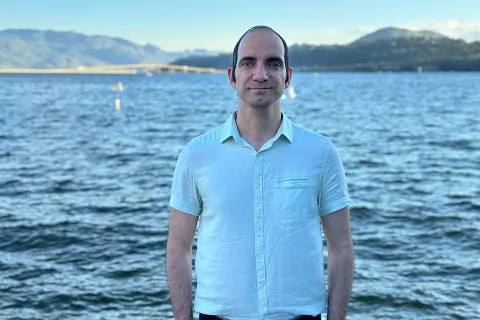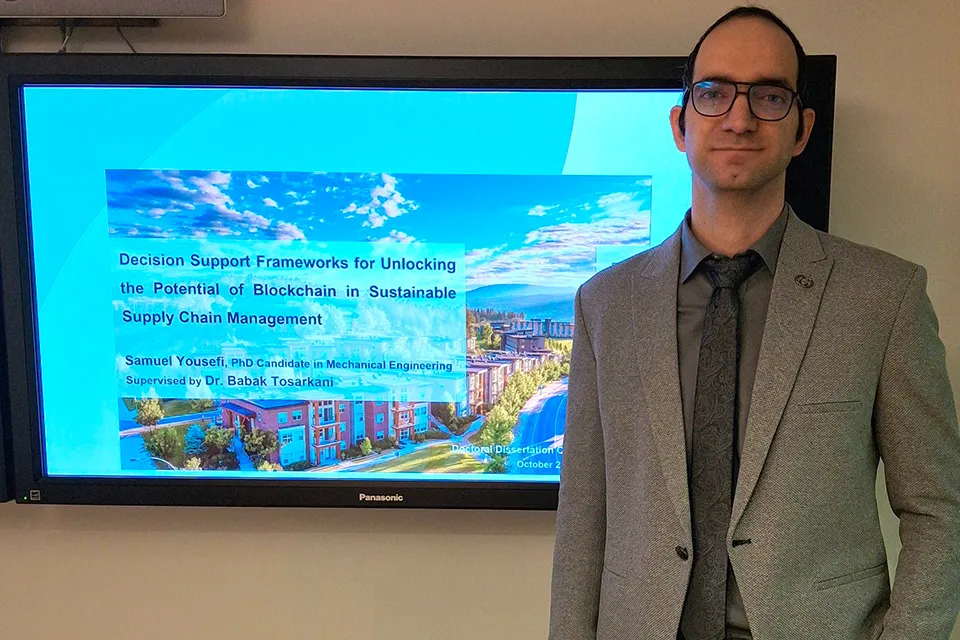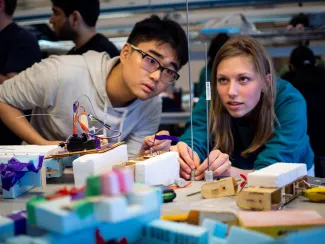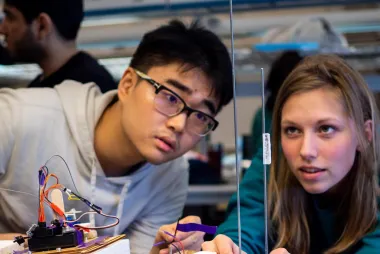Dream without limits, stay rooted in your values, and trust that small, steady steps are the foundation of lasting progress.

Samuel Yousefi
- Degree:
- Doctor of Philosophy
- Grad year: 2025
- Program:
- Campus: Okanagan
I recently completed my PhD in the School of Engineering at the UBC Okanagan campus, where my research focused on supply chain digitalization. Prior to beginning my PhD, I earned my MSc. and BSc. degrees in Industrial Engineering and gained professional experience in my home country, Iran, as a quality assurance specialist and industrial engineer. During my Ph.D. studies at UBC, I had the opportunity to share my research on advancing blockchain-enabled supply chains with a broad audience through academic publications and conference presentations. My work focused on designing decision support systems to assist organizations and industries in transitioning from traditional supply chains to smart, resilient networks capable of adapting to growing globalization and increasing disruptions.
Why did you choose UBC Okanagan?
UBC is a leading research university known for its innovation, academic excellence, and commitment to cutting-edge technological development. It is also recognized for fostering interdisciplinary collaboration across diverse fields. My decision to pursue my PhD at UBC was driven by the alignment between my research interests and the university’s research environment, as well as the chance to contribute to industry-focused projects. Another factor in my choice was the opportunity to work under the supervision of Dr. Babak Tosarkani, whose expertise closely aligned with my academic and professional goals. Over the past four years in the Industrial & Systems Engineering Research Group, led by Dr. Tosarkani, we focused on exploring how blockchain characteristics, such as transparency, traceability, and decentralization, can enhance supply chain sustainability and resiliency. I believe our efforts have highlighted the potential of emerging technologies to address the limitations of traditional supply chains, especially as modern networks involve globally dispersed and often disjointed facilities.
What have you learned that is most valuable?
During my PhD journey at UBC, I recognized that critical thinking and effective communication are as crucial as technical expertise. I had the opportunity to assist in teaching industrial engineering-related courses, contribute to interdisciplinary research projects, collaborate with industry partners, and present at international conferences. These experiences improved my ability to communicate complex ideas clearly to individuals outside my research field and helped me demonstrate the practical relevance of my work. They also enhanced my leadership skills and gave me the confidence to take initiative in research activities and provide meaningful support to my peers.

Who or what has made your time at UBCO memorable?
The most memorable part of my UBC experience has been the people who supported and inspired me throughout my journey. Pursuing a PhD over several years is a demanding path that goes beyond individual effort. I was fortunate to be part of a supportive community of peers and faculty who played a crucial role in my personal and academic growth, especially during the many unexpected turns along the way.
One standout experience was serving as a teaching assistant across several undergraduate and graduate courses. This opportunity not only strengthened my teaching abilities but also led to a meaningful milestone: receiving the 2024 Thank a Prof recognition from UBC’s Centre for Teaching and Learning.
In addition to publishing multiple articles in prestigious international journals, a key highlight was presenting my research at several conferences across Canada, which gave me a valuable opportunity to engage with scholars and professionals from a wide range of disciplines. Receiving the Best Student Paper award at the ASAC 2023 Conference in Toronto, Canada, was a particularly proud and humbling moment that highlighted the significance and quality of my work.
What advice would you give a student pursuing a PhD in engineering?
One key piece of advice for anyone entering this program is to embrace both the challenges and the opportunities to explore new ideas. A PhD is not just about achieving academic success; it is a journey of discovering what motivates you. Don’t be afraid to try different approaches and step outside your comfort zone. This is how you will find the work that you are truly passionate about. There will be times when you feel stuck or uncertain, but don't underestimate your abilities. Keep showing up, stay hopeful, and trust that your efforts will carry you forward.
Success in a graduate program comes not only from what you learn but also from your determination to grow through every challenge and your curiosity to keep exploring.
How did your studies in the Faculty of Applied Science prepare you for the future of work?
Supply chain strategies have evolved rapidly over the past decade, driven by digital innovation, increased environmental accountability, and the growing need to build resilience. My studies at UBC prepared me not only to navigate these changes but also to contribute meaningfully to the future of work in this dynamic field. Through my research on digital transformation, I explored how blockchain technology can enhance the performance, reliability, and robustness of multi-tier supply chains. The future of work in supply chain digitalization will require professionals who can integrate technical knowledge with strategic thinking and a systems-level perspective. I hope to contribute by developing advanced frameworks that help organizations adopt emerging technologies while balancing environmental and social goals. I also aim to help shape supply chain networks that are efficient and sustainable, as well as resilient enough to respond to potential disruptions caused by both natural and human-made events.
What is next for you?
I am currently a Postdoctoral Research Fellow at UBC Okanagan, where I focus on enhancing circular supply chains and supporting the global transition to net-zero emissions through innovative and adaptive solutions.
Looking ahead, I will be joining Ontario Tech University as a tenure-track Assistant Professor, combining my passion for research and teaching. I aim to help shape the next generation of engineers and supply chain professionals by equipping them with the tools, knowledge, and mindset needed to tackle complex challenges. Through collaborative research and real-world application, I hope to drive meaningful change in how supply chains are designed and advanced toward greater sustainability and resilience.


